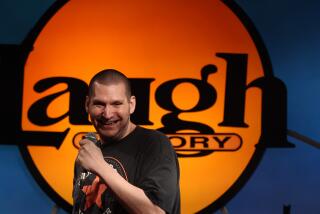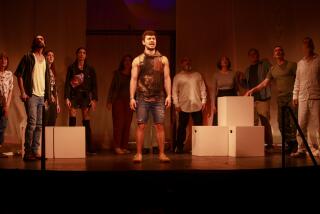PBS SPECIAL : ‘AIDS SHOW’: DAILY LIFE WITH A KILLER
- Share via
NEW YORK — The gay community responds to the emotional, rather than the medical, consequences of the AIDS epidemic in an hourlong program on public television this week.
“The AIDS Show” draws its title from a stage production of sketches and songs created by San Francisco’s Theater Rhinoceros company. The acronym is both for acquired immune deficiency syndrome and for Artists Involved with Death and Survival.
The program consists of excerpts from the revue, which attempts to recreate how various members of the gay community deal daily with the disease. It also presents interviews with the writers, directors and actors involved in the Rhinoceros production.
In Southern California, the special is to be broadcast at 10 p.m. Friday on Channels 15 and 28.
“As gay men, AIDS was becoming more and more prominent in our minds and in our lives, as more and more people we knew were dying of the disease,” said Robert Epstein, co-producer of the documentary with Peter Adair, explaining why the two film makers decided to translate the revue to film.
“We haven’t yet seemed to be able to control the virus, except to try to prevent its spread, but we can take some control emotionally,” Epstein said.
Epstein, who directed and co-produced the Oscar-winning documentary “The Times of Harvey Milk,” and Adair, who produced and co-directed the landmark documentary portrait of gays, “Word Is Out,” were in New York from their home in San Francisco trying to find broader distribution for their latest documentary at an independent film market. They said they also plan to make the film available within the gay community.
The film makers recounted dragging themselves to a 1985 workshop production of the Rhinoceros project, only to come away “laughing and feeling excited about the strength we found there.”
“AIDS was the last thing I wanted to deal with. . . . I didn’t want to confront it, and I was doing my best to avoid (the subject),” Epstein said of his initial reluctance to attend the Rhinoceros show.
“What this play showed us was that in some sense this disease has strengthened, rather than weakened, the gay community and culture that we have been involved in building up over the last 10 years,” Adair said, referring to “the care that we have had to take of each other. It’s this aspect of the crisis that we wanted to put on film.”
With the “100% support” of KQED, San Francisco’s public television station, the two film makers said they raised most of the $100,000 for the documentary within the gay community--from San Francisco cocktail parties and passing the hat in Omaha to political and social-service organizations such as Laguna Beach Outreach.
More to Read
The complete guide to home viewing
Get Screen Gab for everything about the TV shows and streaming movies everyone’s talking about.
You may occasionally receive promotional content from the Los Angeles Times.






